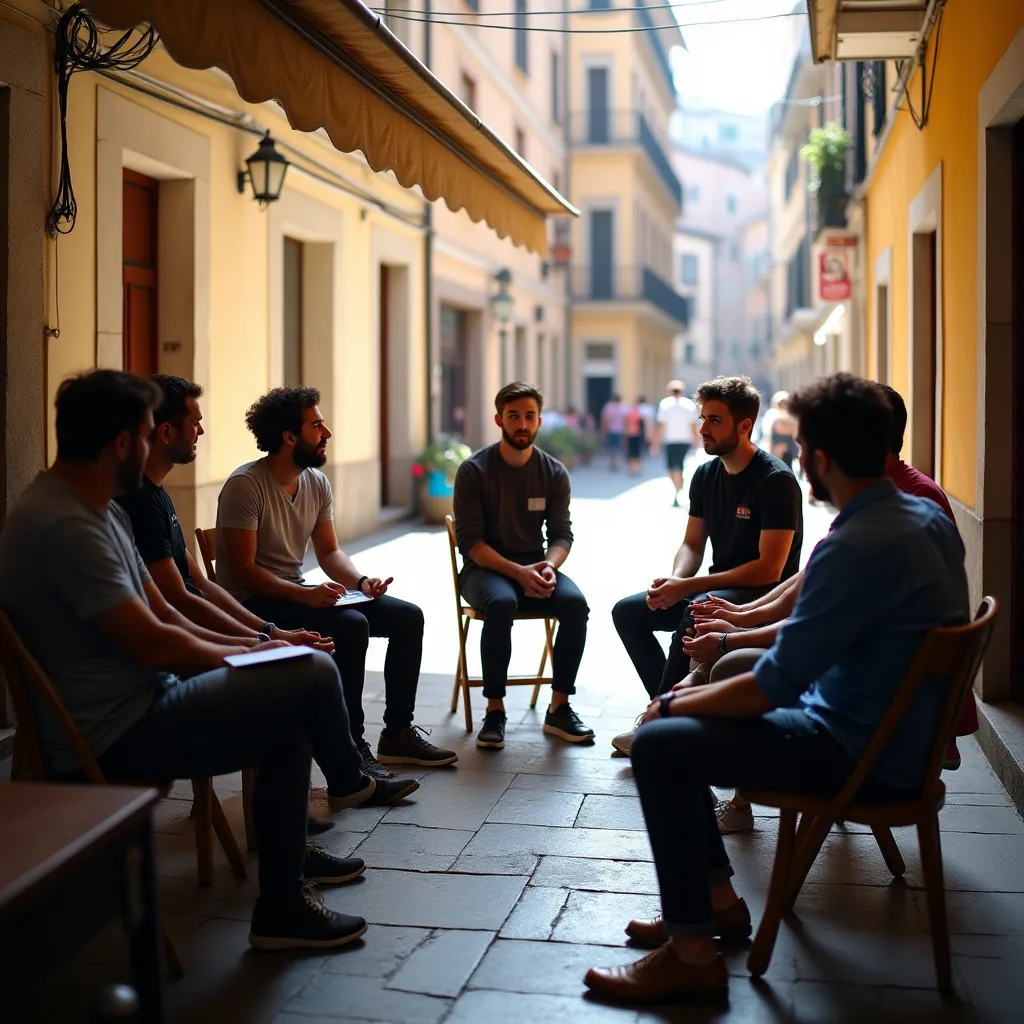Avventure Indimenticabili Ti Aspettano
Avventure Indimenticabili Ti Aspettano
Benvenuti in PixelTale Studios, dove ogni gioco racconta una storia. Siamo appassionati di avventure che emozionano e intrattengono.

Benvenuti in PixelTale Studios, dove ogni gioco racconta una storia. Siamo appassionati di avventure che emozionano e intrattengono.

PixelTale Studios è uno studio di sviluppo videoludico dedicato alla creazione di giochi avventurosi e narrativi. La nostra passione per le storie ci guida nella realizzazione di esperienze interattive che lasciano un segno.
Esperienze di gioco profonde che coinvolgono i giocatori in storie uniche e affascinanti.
Integriamo elementi culturali italiani, creando giochi che riflettono la nostra eredità e attraggono il mercato locale.
Libertà creativa per realizzare visioni artistiche uniche, senza compromessi, per un'esperienza di gioco autentica.
Collaboriamo con i giocatori, raccogliendo feedback per migliorare i nostri giochi e creare una community attiva e appassionata.
Offriamo una gamma di servizi creativi e tecnici per trasformare le tue idee in realtà videoludiche. Dalla progettazione alla programmazione, siamo qui per guidarti in ogni fase del processo.

Creiamo giochi che intrecciano narrazione e gameplay, offrendo esperienze coinvolgenti per tutti i giocatori. Ogni progetto è frutto di passione e dedizione.

Offriamo servizi completi di progettazione del gioco, creando meccaniche coinvolgenti e mondi affascinanti che catturano l'immaginazione. Collaboriamo strettamente con i nostri clienti per garantire che la loro visione prenda vita.

Offriamo servizi di consulenza per sviluppatori indie, aiutandoli a perfezionare le loro idee e portarle sul mercato. Con un team esperto, forniamo supporto in ogni fase.

La nostra équipe è specializzata nella creazione di colonne sonore suggestive che accompagnano il giocatore in ogni avventura. Un buon sound design è fondamentale per un'esperienza immersiva e memorabile.

Collaboriamo con artisti e scrittori emergenti per sviluppare progetti unici che sfidano le convenzioni. Insieme, possiamo creare un'opera d'arte interattiva.

Offriamo supporto continuo per ogni progetto, dalla concezione alla pubblicazione. La nostra esperienza garantisce risultati di alta qualità e soddisfazione del cliente.
Scopri i nostri giochi unici, ricchi di storie avvincenti e ambientazioni mozzafiato. Ogni avventura è realizzata con cura per offrire un'esperienza indimenticabile.
I nostri giochi offrono un'esperienza immersiva grazie a storie avvincenti e ambienti dettagliati. Ogni scelta del giocatore influisce sulla trama, creando coinvolgimento. La narrazione è al centro della nostra progettazione.
Offriamo esperienze di gioco immersive che coinvolgono i sensi e le emozioni. Ogni gioco è progettato per trasportare il giocatore in mondi unici e affascinanti.
Collaboriamo strettamente con i nostri clienti durante tutto il processo di sviluppo. Le riunioni regolari e il feedback continuo garantiscono che la visione del cliente sia realizzata. Crediamo nella trasparenza e nella comunicazione aperta.
Siamo sempre alla ricerca di nuove tecnologie e tendenze per migliorare i nostri giochi. L'innovazione è al centro della nostra filosofia. Rimanere aggiornati è cruciale nel settore dei giochi.
Offriamo una serie di servizi per soddisfare le esigenze nel campo dei giochi narrativi. Dalle consulenze al supporto post-lancio, ci impegniamo a fornire qualità e innovazione in ogni progetto.
Include sviluppo completo, design, testing e supporto post-lancio.
Servizio per la creazione di prototipi di gioco per testare le meccaniche e le idee.
Offriamo pacchetti di sviluppo personalizzati per startup nel settore dei giochi, fornendo supporto completo dalla concezione alla realizzazione.
Il nostro team di talentuosi sviluppatori e narratori lavora instancabilmente per portare alla vita avventure straordinarie. Insieme, creiamo mondi che ispirano e coinvolgono.

Game Designer

Narrativa delle Storie

Programmatore di Gioco

Artista Visivo

Sound Designer
Leggi le testimonianze dei nostri clienti e dei nostri giocatori. Siamo orgogliosi dei feedback positivi che riceviamo per i nostri giochi e servizi.
PixelTale Studios ha creato un gioco che ha superato le mie aspettative. La narrativa è coinvolgente e ogni scelta conta. Non vedo l'ora di vedere cosa faranno in futuro!
Un'avventura coinvolgente che ti lascia con il fiato sospeso fino all'ultima pagina.
Ho avuto un'esperienza fantastica con PixelTale Studios. Il loro supporto è stato eccezionale e il gioco è stato un successo. Consiglio vivamente di collaborare con loro.
Il gioco ha superato le mie aspettative in termini di trama e grafica. È chiaro che c'è stata molta passione e dedizione nella sua creazione. Non vedo l'ora di giocare al prossimo!
Il team di PixelTale Studios ha una vera passione per i giochi. La loro attenzione ai dettagli e la creatività brillano nei loro progetti. Sono entusiasta di vedere cosa ci riserva il futuro!
Queste case studies evidenziano i risultati misurabili dei nostri progetti e l'impatto positivo sui giocatori e sulla community.
Abbiamo creato un gioco di avventura interattiva che ha visto un incremento dell'engagement del 70% rispetto ai titoli precedenti, con oltre 15.000 download nelle prime due settimane.
Questo progetto ha aumentato la retention dei giocatori del 50% grazie a una narrativa avvincente e alla personalizzazione del personaggio, raggiungendo un punteggio medio di 4.8 su 5 nelle recensioni.
In un progetto di avventura romantica, abbiamo ridotto i costi di sviluppo del 30% attraverso un'efficiente gestione del progetto. Il gioco è stato lanciato in 12 mesi e ha ricevuto recensioni eccellenti, generando un ritorno sull'investimento del 150%.
Il nostro processo di sviluppo è strutturato in fasi chiare e collaborative, per garantire risultati di alta qualità e soddisfare le aspettative dei nostri clienti.
Iniziamo con un incontro di consultazione per capire le tue esigenze e visioni per il progetto.
Creiamo una documentazione di design dettagliata e iniziamo a costruire un prototipo. Questa fase dura tipicamente 3-6 mesi, a seconda della complessità del gioco.
Iniziamo il vero e proprio sviluppo del gioco, creando grafica, codice e contenuti. Controlli di qualità regolari assicurano che il progetto rimanga in linea con le aspettative.
Procediamo con lo sviluppo completo del gioco, con una durata complessiva di 12-18 mesi. Durante questa fase, lavoriamo a stretto contatto con il cliente per assicurare che il design e la narrazione siano allineati alle aspettative.
Testiamo il gioco con un gruppo selezionato di utenti per identificare eventuali problemi e apportare miglioramenti basati sui loro feedback.
Dalla fondazione a oggi, abbiamo raggiunto traguardi significativi che segnano la nostra evoluzione come studio di giochi indie.
PixelTale Studios è stata fondata nel 2013, con una passione per la creazione di giochi avventurosi. Nei primi due anni, abbiamo completato 5 progetti, raggiungendo 1.000 giocatori.
Nel 2015, abbiamo lanciato il nostro primo gioco, ottenendo un ottimo riscontro e un aumento della nostra clientela a oltre 5.000 giocatori. Il gioco ha vinto diversi premi locali per la sua narrativa coinvolgente.
Nel 2019, abbiamo raddoppiato le dimensioni del nostro team, passando da 5 a 10 membri, per supportare lo sviluppo di titoli più complessi.
Nel 2021, abbiamo pubblicato un gioco che ha raggiunto 50.000 download nel primo mese, diventando il nostro titolo di maggior successo.
Nel 2023, abbiamo aperto il nostro secondo ufficio a Milano, ampliando le nostre capacità e risorse per la creazione di giochi.
Offriamo un ambiente stimolante e creativo, dove ogni membro del team contribuisce al successo collettivo.
Come Game Designer, sarai responsabile della progettazione delle meccaniche di gioco e della creazione di esperienze coinvolgenti per i giocatori. Collaborerai con il team di sviluppo e scrittori per realizzare la visione del gioco.
Full-timeI Programmatori di Gioco sviluppano il codice del gioco, implementando le funzionalità e ottimizzando le prestazioni. Devono avere esperienza con linguaggi di programmazione come C# e C++.
Full-timeL'Artista 3D crea modelli e animazioni per i personaggi e gli ambienti di gioco, contribuendo a dare vita alle nostre storie. È fondamentale avere un forte portfolio.
Full-timeIn qualità di Programmatore di Gioco, svilupperai e implementerai il codice per le meccaniche di gioco e le funzionalità. Collaborerai con il team per garantire l'ottimizzazione e il buon funzionamento del prodotto finale.
Part-timePixelTale Studios è il tuo partner ideale nel mondo del game development, con un forte focus sulla narrazione e sull'esperienza utente. Siamo appassionati di creare giochi che non solo intrattengono, ma raccontano storie che rimangono nel cuore.
La nostra missione è creare giochi che raccontano storie indimenticabili e coinvolgenti. Vogliamo trasportare i giocatori in avventure straordinarie. La passione per la narrazione è al centro di ogni progetto.
I nostri principi fondamentali includono innovazione, creatività e collaborazione. Ci impegniamo a lavorare insieme per realizzare giochi di alta qualità. La comunicazione aperta è essenziale nel nostro team.
Scopri i nostri giochi avvincenti che uniscono narrazione profonda e gameplay innovativo. Ogni avventura è progettata per coinvolgere e sorprendere i giocatori.
La nostra filosofia è quella di mettere la creatività al primo posto. Siamo convinti che le migliori idee nascano da un ambiente di lavoro stimolante. Incoraggiamo il pensiero originale e il rischio calcolato.
Scopri il cuore pulsante di PixelTale Studios, dove creatività e passione si uniscono per dar vita a storie indimenticabili e avventure coinvolgenti. La nostra missione è quella di emozionare e intrattenere attraverso esperienze di gioco uniche.
La nostra visione è diventare un leader nel settore dei giochi narrativi. Vogliamo continuare a innovare e sorprendere i giocatori. La crescita sostenibile e l'impatto positivo nella comunità sono importanti per noi.
Siamo sempre felici di ascoltare i nostri fan e collaboratori. Contattaci per domande, suggerimenti o semplicemente per condividere la tua passione per i giochi indie!
+39 333 804-9992
hello@ajscreativecreations.com
Centro Affari Prestigio, Via Vittorio Veneto 125, Floor 6, Office 32, 00187 Rome, Italy
In questa sezione troverai risposte alle domande più comuni sui nostri giochi e sul processo di sviluppo.
Ci concentriamo su giochi di avventura narrativi, che combinano storie immersive con meccaniche di gioco coinvolgenti. Ogni progetto è unico e viene progettato per offrire un'esperienza emozionante e memorabile.
La durata dello sviluppo varia a seconda della complessità del progetto. In genere, i giochi richiedono tra i 6 e i 18 mesi per essere completati, considerando fasi di progettazione, sviluppo, test e ottimizzazione.
Abbiamo oltre 10 anni di esperienza collettiva nel settore dei giochi, con un team di esperti che ha lavorato a più di 15 progetti pubblicati, ottenendo recensioni positive e un'ampia base di fan.
Sì, offriamo supporto post-lancio per risolvere eventuali bug e per implementare aggiornamenti. La nostra priorità è garantire un'esperienza di gioco ottimale anche dopo il lancio.
Sì, ci impegniamo a rendere i nostri giochi accessibili su diverse piattaforme, tra cui PC, console e dispositivi mobili, per raggiungere un pubblico più ampio.
Il nostro processo di sviluppo include la fase di brainstorming, la scrittura della sceneggiatura, lo sviluppo grafico, la programmazione e il testing. Ogni fase è monitorata attentamente per garantire la qualità e l'innovazione del prodotto finale.
Puoi sostenere il nostro studio acquistando i nostri giochi, condividendo le tue opinioni e recensendo i nostri titoli sui social media. Inoltre, segui i nostri canali per rimanere aggiornato su eventi e campagne di crowdfunding.
Stiamo attualmente lavorando a diversi nuovi titoli e stiamo esplorando nuove tecnologie per migliorare l'esperienza di gioco. Prevediamo di annunciare nuovi progetti nei prossimi mesi.
Offriamo rimborsi entro 14 giorni dall'acquisto, a condizione che il gioco non sia stato utilizzato in modo significativo e che sia restituito nelle stesse condizioni. Per avviare una richiesta di rimborso, contattateci direttamente.
Offriamo rimborsi entro 14 giorni dall'acquisto, a condizione che il gioco non sia stato avviato. Contattaci per assistenza nel processo di rimborso.